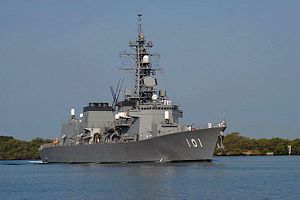Two takeaways linger from the Naval Diplomat’s trip to Yokosuka a couple of weeks back, which included a visit to the destroyer JDS Murasame. First: Japanese mariners grok the value of naval diplomacy. Appearances matter in maritime affairs, and so diplomatic outreach demands showmanship. Indeed, the routine ship tour — a humdrum chore that provokes grousing from junior officers and enlisted crewmen everywhere — turns out to be a handy if not indispensable political implement. This larger purpose was largely lost on me during my time in uniform, when I was saddled with my share of ship tours. Tours were tedium! With no point other than kissing up to muckety-mucks!!! Or so it seemed.
Done right, though, naval outreach impresses visitors. It shapes perceptions among audiences able to influence a nation’s nautical destiny. Think about it. The ability to prevail in combat is the true audit of a navy’s adequacy. In peacetime, however, it’s tough to gauge the efficacy of a man-of-war, or its armament. Crews expend practice rounds in maneuvers, but there’s a canned quality to peacetime exercises. The atmosphere of war — danger, chance and confusion, stark passions like fear and spite — is hard to replicate absent a thinking adversary who returns fire. The best exercises, then, are doubtful indices of military effectiveness.
If naval leaders want to burnish their fleet’s reputation for seamanship and combat prowess, consequently, presenting ships and aircraft well represents their best substitute for battle results. The look of a ship matters. Granted, the best-looking fleet may not be the most capable. It’s possible to spend too much time and effort making a ship a showboat, to the detriment of battle efficiency. All else being equal, however, bet on the contender that deploys clean, tidy, rust-free warships against a fleet of rustbuckets. Good upkeep projects an image of competence and pride. In all likelihood, a well-kept vessel is a well-handled vessel. A slovenly vessel? Fuggedaboutit.
The JMSDF presents itself well. Murasame appeared immaculate to this mariner’s eye, both inside and out. (Sample size of one ship at one time, I grant you; but that’s true of all such visits.) The captain and officers turned out in dress blues, while the squadron commander joined us for lunch. (“Imperial Japanese curry” was on the menu; let the conspiracy theories commence.) Like any good diplomat, moreover, the ship made good use of happenstance. The spokesman for the ship was a doughty young sea fighter who spent most of his life in … Narragansett, Rhode Island. That’s about twenty miles from the Naval Diplomat’s lair somewhere alongside the Narragansett Bay. A Japanese petty officer with a New England accent — you can’t make such things up.
Second takeaway: China’s navy, coast guard, and fishing fleet — the official and unofficial elements of Chinese sea power — are running the JMSDF ragged in the East China Sea, as Beijing tries to wrench control of the Senkaku Islands from Tokyo and otherwise make the China seas its preserve. Where Chinese vessels go, Japanese ships must follow to preserve effective control of the Senkakus and adjoining waters. China holds the initiative, and it boasts many, many vessels. Small-stick diplomacy remains Beijing’s strategy of the hour.
The imperative to police southwestern waters translates into a helter-skelter operating tempo for JMSDF ships and aircraft. Murasame officers report spending 25 more days at sea in 2013 than in 2012, and the pace is far from slackening. The ship, then, is spending fully half of each year riding the waves. That amount of at-sea time spells more wear-and-tear on hardware, bigger fuel and maintenance bills, and longer stretches away from families and friends.
But there is an upside. Going to sea is how sailors learn the ins and outs of their profession. More steaming days gives Japanese crewmen more time to hone their skills, and China’s tactics supply the incentive to do so. Lord Nelson cracked wise about Great Britain’s blockade of France during the Napoleonic Wars. Nelson conceded that Royal Navy ships took a beating in heavy weather, but he insisted that near-constant blockade duty refined Jack Tar’s seamanship. Meanwhile, French sailors remained in port, doing…. Well, you can imagine what sailors do when confined to port with little to do. French prowess atrophied, and the navy suffered repeated thrashings at British hands.
China’s strategy in the East China Sea is taking its toll on Japanese resources. But should it come to armed conflict, Beijing may rue forcing JMSDF crews to spend so much time practicing tactics and shiphandling. It may be unwittingly honing an adversary’s skills while steeling his resolve.

































